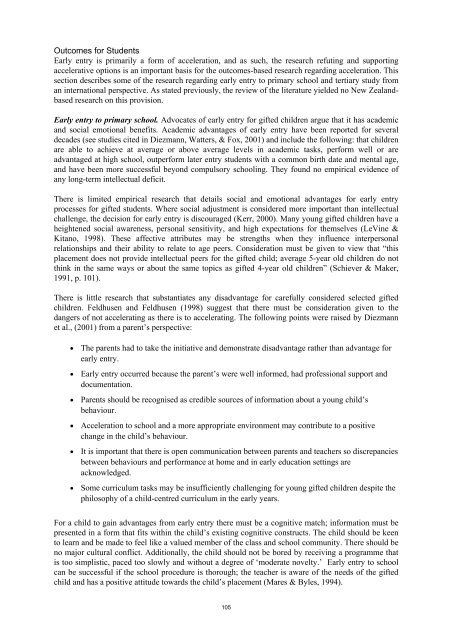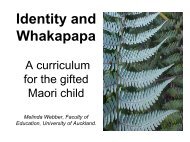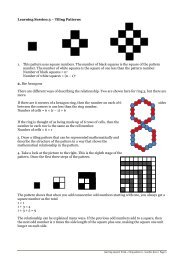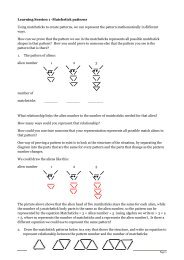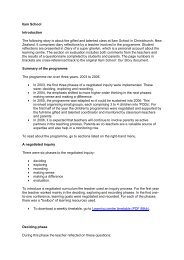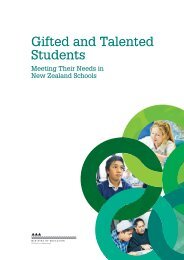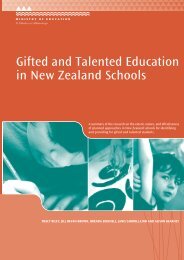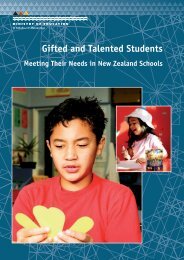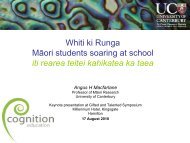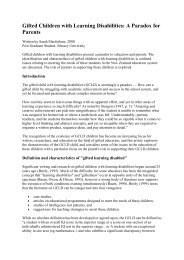The Extent, Nature and Effectiveness of Planned Approaches in ...
The Extent, Nature and Effectiveness of Planned Approaches in ...
The Extent, Nature and Effectiveness of Planned Approaches in ...
Create successful ePaper yourself
Turn your PDF publications into a flip-book with our unique Google optimized e-Paper software.
Outcomes for StudentsEarly entry is primarily a form <strong>of</strong> acceleration, <strong>and</strong> as such, the research refut<strong>in</strong>g <strong>and</strong> support<strong>in</strong>gaccelerative options is an important basis for the outcomes-based research regard<strong>in</strong>g acceleration. Thissection describes some <strong>of</strong> the research regard<strong>in</strong>g early entry to primary school <strong>and</strong> tertiary study froman <strong>in</strong>ternational perspective. As stated previously, the review <strong>of</strong> the literature yielded no New Zeal<strong>and</strong>basedresearch on this provision.Early entry to primary school. Advocates <strong>of</strong> early entry for gifted children argue that it has academic<strong>and</strong> social emotional benefits. Academic advantages <strong>of</strong> early entry have been reported for severaldecades (see studies cited <strong>in</strong> Diezmann, Watters, & Fox, 2001) <strong>and</strong> <strong>in</strong>clude the follow<strong>in</strong>g: that childrenare able to achieve at average or above average levels <strong>in</strong> academic tasks, perform well or areadvantaged at high school, outperform later entry students with a common birth date <strong>and</strong> mental age,<strong>and</strong> have been more successful beyond compulsory school<strong>in</strong>g. <strong>The</strong>y found no empirical evidence <strong>of</strong>any long-term <strong>in</strong>tellectual deficit.<strong>The</strong>re is limited empirical research that details social <strong>and</strong> emotional advantages for early entryprocesses for gifted students. Where social adjustment is considered more important than <strong>in</strong>tellectualchallenge, the decision for early entry is discouraged (Kerr, 2000). Many young gifted children have aheightened social awareness, personal sensitivity, <strong>and</strong> high expectations for themselves (LeV<strong>in</strong>e &Kitano, 1998). <strong>The</strong>se affective attributes may be strengths when they <strong>in</strong>fluence <strong>in</strong>terpersonalrelationships <strong>and</strong> their ability to relate to age peers. Consideration must be given to view that “thisplacement does not provide <strong>in</strong>tellectual peers for the gifted child; average 5-year old children do notth<strong>in</strong>k <strong>in</strong> the same ways or about the same topics as gifted 4-year old children” (Schiever & Maker,1991, p. 101).<strong>The</strong>re is little research that substantiates any disadvantage for carefully considered selected giftedchildren. Feldhusen <strong>and</strong> Feldhusen (1998) suggest that there must be consideration given to thedangers <strong>of</strong> not accelerat<strong>in</strong>g as there is to accelerat<strong>in</strong>g. <strong>The</strong> follow<strong>in</strong>g po<strong>in</strong>ts were raised by Diezmannet al., (2001) from a parent’s perspective:• <strong>The</strong> parents had to take the <strong>in</strong>itiative <strong>and</strong> demonstrate disadvantage rather than advantage forearly entry.• Early entry occurred because the parent’s were well <strong>in</strong>formed, had pr<strong>of</strong>essional support <strong>and</strong>documentation.• Parents should be recognised as credible sources <strong>of</strong> <strong>in</strong>formation about a young child’sbehaviour.• Acceleration to school <strong>and</strong> a more appropriate environment may contribute to a positivechange <strong>in</strong> the child’s behaviour.• It is important that there is open communication between parents <strong>and</strong> teachers so discrepanciesbetween behaviours <strong>and</strong> performance at home <strong>and</strong> <strong>in</strong> early education sett<strong>in</strong>gs areacknowledged.• Some curriculum tasks may be <strong>in</strong>sufficiently challeng<strong>in</strong>g for young gifted children despite thephilosophy <strong>of</strong> a child-centred curriculum <strong>in</strong> the early years.For a child to ga<strong>in</strong> advantages from early entry there must be a cognitive match; <strong>in</strong>formation must bepresented <strong>in</strong> a form that fits with<strong>in</strong> the child’s exist<strong>in</strong>g cognitive constructs. <strong>The</strong> child should be keento learn <strong>and</strong> be made to feel like a valued member <strong>of</strong> the class <strong>and</strong> school community. <strong>The</strong>re should beno major cultural conflict. Additionally, the child should not be bored by receiv<strong>in</strong>g a programme thatis too simplistic, paced too slowly <strong>and</strong> without a degree <strong>of</strong> ‘moderate novelty.’ Early entry to schoolcan be successful if the school procedure is thorough; the teacher is aware <strong>of</strong> the needs <strong>of</strong> the giftedchild <strong>and</strong> has a positive attitude towards the child’s placement (Mares & Byles, 1994).105


